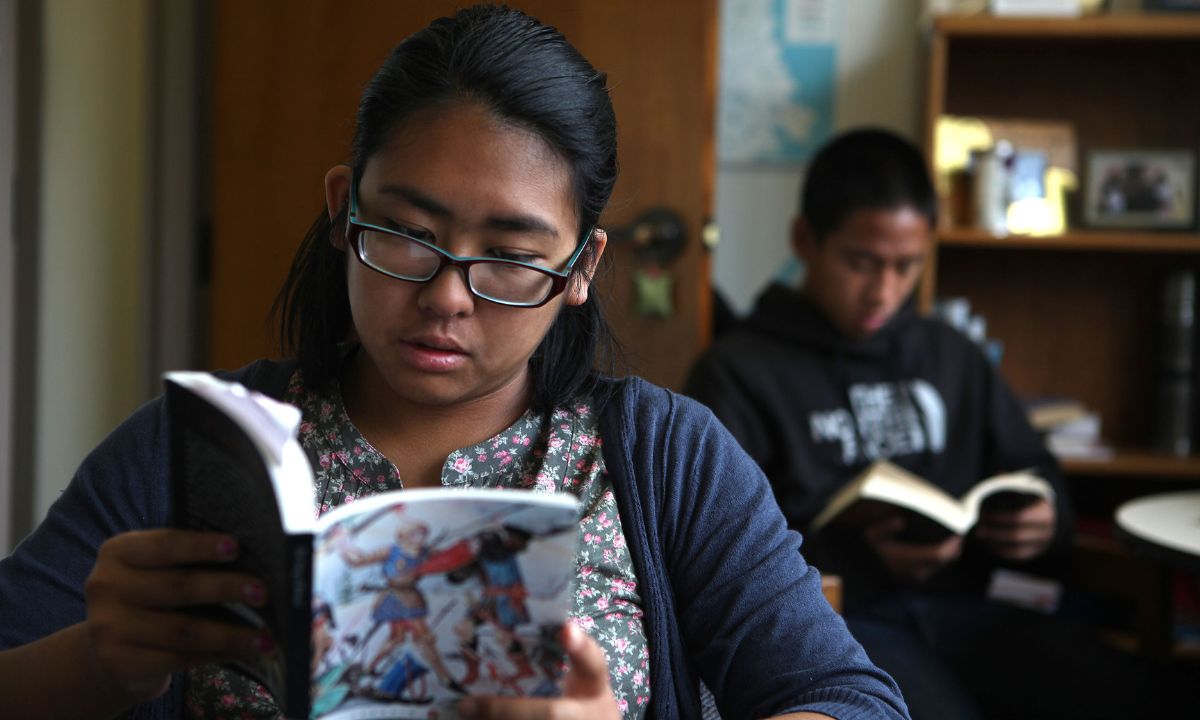Summer Reading Can Help Boost Literacy. Why Don’t High Schools Require It?
Cohen: Survey of D.C.-area high schools shows few assign books to incoming 9th graders to read during vacation. That's a lost opportunity.

Get stories like this delivered straight to your inbox. Sign up for The 74 Newsletter
On the 2024 National Assessment of Educational Progress, just 30% of eighth-graders were proficient in reading, down from 34% in 2019. But for students in the 10th percentile — the lowest achievers — that score has dropped 19 points in a decade. They’re not alone: Youngsters in the 25th percentile have seen a 13-point decline over the same period. These disastrous drops are often masked by averages that include higher scores posted by students at the top of the achievement ladder. But it is clear that struggling readers in middle school are now reading at much lower levels. Some of this may be because they are reading less than they used to.
Just 14% of 13-year-olds reported reading daily for fun in 2023, compared with 37% 30 years earlier. Op-eds and analyses mourn that teenagers no longer read books; meanwhile, children ages 8 to 18 spend 7.5 hours per day, on average, on screens. If there’s one institution that can make teenagers read, it’s school. And if there’s one time of year when teens have ample time on their hands, it’s summer. Indeed, to read a 300-page book over nine weeks of summer vacation is to read five pages a day. So it would make sense for schools to ask students to read more books when class is out.
I looked at 32 high schools in Maryland, the District of Columbia and Virginia to understand the state of summer reading assignments in 2025. The results are disheartening.
Only 54% assign any summer reading for incoming ninth-graders. While 90% of private schools studied have such a requirement, only 38% of public schools do — and at three of those, the “summer reading assignment” doesn’t actually involve a book.
Maryland’s Bethesda-Chevy Chase High School asks incoming ninth-graders to read three New York Times articles and write a short paragraph about each. Catonsville High School in Baltimore County asks new high school students to read an article titled “Zombie Apocalypse.” The Summer Reading Choice Board at Albert Einstein High School in Kensington, Maryland, requires completion of one of four tasks: watching a documentary, listening to a music album, or reading an article or a six-page short story. In Montgomery County, Maryland; Fairfax County, Virginia; and neighboring districts, splashy graphics on school websites tell students they should strongly consider reading a book over the summer — which won’t convince anyone who isn’t interested in reading to start or entice a student who is reading to tackle something new or challenging.
Five schools actually ask students to read more than one book — all of them private schools. Holton-Arms, an all-girls school in Bethesda, leads the pack with a four-book requirement. A six-minute drive away, at public Whitman High School, students are told to read any book that is at least 150 pages and to take notes in the margins or on sticky notes. Whitman is in the same district as Einstein and Bethesda-Chevy Chase high schools, so it’s clear the central office plays no role in requiring student summer reading. The same is true in the District of Columbia Public Schools, which before COVID required students to read a book and complete a writing assignment over the summer — and posted an 80% compliance rate — but now has nothing.
Even when districts do attempt to set a reading bar, the results are uneven.
For example, the Newark Board of Education declared that this summer, incoming ninth-graders in the district’s 18 high schools would be required to read S.E. Hinton’s The Outsiders and complete three related activities. But on East Side High’s school website, the summer English assignment is to watch a TED talk and a movie. Central High prominently displays the assignment for The Outsiders, but most other Newark high schools don’t have anything listed on their websites at all about summer reading.
Evidence from my survey suggests that public schools serving more affluent communities are more likely to mandate summer reading. Whitman is one of the most affluent neighborhood high schools in Montgomery County and the only one to require students to read a book. Similarly, Staples High School in Westport, Connecticut, where 2% of students are low-income, requires ninth-graders to read two books; Highland Park High School, outside Dallas (no low-income students), requires incoming ninth-graders to read Paulo Coehlo’s The Alchemist; and New Trier High School, just north of Chicago (3% low-income students), assigns specific books based on incoming students’ ninth-grade English placement.
But affluence doesn’t guarantee a commitment to summer reading, either. Newton North High School, outside Boston, asks students to consider picking up a book, as does Harriton High School on Philly’s Main Line. Both districts have fewer than 18% low-income students. Georgetown Day School, the D.C. prep school where Supreme Court Justice Ketanji Brown Jackson sends her child, provides only a suggested reading list, as does New York City’s Dalton School.
The class that enters ninth grade this fall was in third grade when the pandemic hit. By the time these students began middle school, education was back to “normal,” and they’ve had years to be sold on the importance of academics, community and all that school has to offer. But a survey of middle schoolers in 2024 found that only 28% agree that “in school, people don’t give up when the work gets hard.” Less than half agree that “at my school, we use our thinking skills, rather than just memorizing things.” In their recent book “The Disengaged Teen,” authors Rebecca Winthrop and Jenny Anderson write that to address these sobering statistics, “what kids need now is to become better at learning.” Reading positively affects adolescent language ability and brain development, among other benefits, suggesting that literacy itself might be a tool for helping young adults further develop their ability to learn. Demanding a few hours of reading over the course of the summer is a small but meaningful step that can only help.
Get stories like these delivered straight to your inbox. Sign up for The 74 Newsletter

;)
